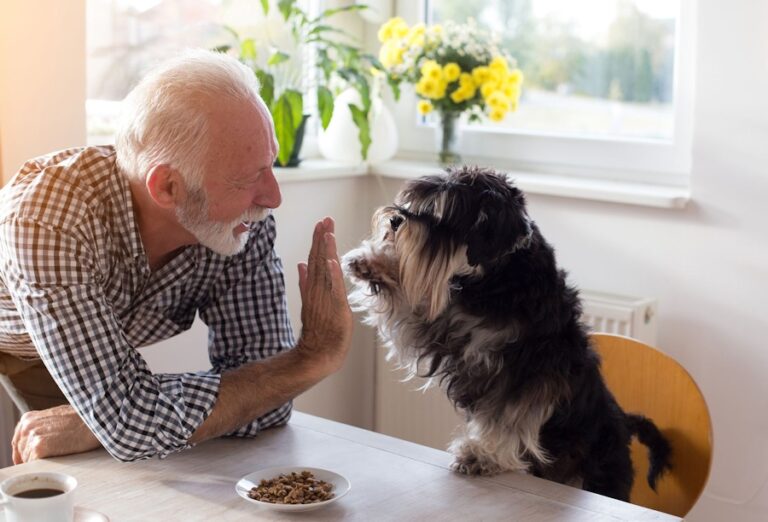
People Foods Can Be Hazardous to Your Dog
If you are like most dog owners, you consider your pet to be a member of your family. There are lots of great ways to shower your dog with love. Giving Fido a yummy treat is one of those ways. However, sharing a treat of “people food” with your dog can be dangerous.
Some very common people foods are toxic to dogs and can cause mild to quite serious medical issues if ingested by your pet. Not all people foods will cause health problems, but it is important to know the ones that could be perilous. If you’re uncertain whether or not it’s safe to give a specific food to your dog, do not take the risk.
Ignoring a look of yearning in your pet’s loving eyes is difficult, but it’s important to remember that a reward from your plate may not be the treat you think it is and could end up in illness or worse for your four-footed friend. To keep your dog out of harm’s way, it’s usually best to stick to pet foods and treats specifically formulated for dogs. There are plenty of really delicious ones on the market… so delicious, in fact, we human beings would probably enjoy them!
The following is a list of some people foods that should not be shared with your dog. A few may surprise you. Make sure to speak with your veterinarian about foods before adding them to your dog’s diet.
A few “no-no” people foods that should be avoided…
CHOCOLATE AND CAFFEINE
Chocolate and caffeine can cause major health problems for some dogs, including severe heart and nervous system damage. The amount of chocolate/caffeine consumed and the size of the dog involved will impact the level of danger and symptoms experienced. In most cases, darker chocolates pose more danger. Symptoms to look out for include (but may not be limited to) vomiting, diarrhea, pain or discomfort in the stomach area, panting, elevated thirst, high body temperature, seizures, and/or an abnormal heartbeat.
GRAPES, RAISINS, AND CURRENTS
Consuming even a small quantity of grapes, raisins, or currents can cause health issues in some dogs, but not in others. The potential for kidney failure and even death can exist even with a small amount. It’s impossible to predict how your dog will respond. Foods containing raisins – like trail mix or bagels – also can be dangerous. Symptoms to look out for include (but may not be limited to) decreased appetite, abdominal pain, changes in urine output, lethargy, weakness, and/or vomiting.
RAW MEAT
It’s commonly believed that uncooked meant is a tasty and healthy treat for a dog. However, the American Veterinary Medical Association advises against feeding raw foods to dogs. Raw meats can harbor bacteria that can cause severe problems in the digestive tract. It’s important to make sure your dog can not reach any meats you set on the kitchen counter to defrost. Symptoms to look for include (but may not be limited to) vomiting, fever, abdominal discomfort, and diarrhea that’s watery and/or contains blood or mucus.
ONIONS, GARLIC, SHALLOTS, SCALLIONS, ETC.
All members of the onion family are toxic to dogs, as are any powders, oils, dehydrated products, and prepared foods containing them. Onion/garlic poisoning can cause gastroenteritis, liver damage, and anemia among other issues. Symptoms to look out for include (but may not be limited to) irritation in the mouth and throat, pale gums, drooling, vomiting, diarrhea, weakness, abdominal pain, rapid heart rate, and/or elevated respiratory rate.
MACADAMIA NUTS
Most nuts are bad for dogs, but ingesting just a few macadamia nuts can cause severe health issues. Eating macadamia nuts can even cause paralysis. Symptoms to look out for include (but may not be limited to) vomiting, weakness, listlessness, stiffness, elevated body temperature, loss of coordination, and difficulty walking.
BAKING SODA, BAKING POWDER, AND YEAST
Consuming a leavening agent – like baking soda, baking powder, and yeast – or unbaked bread dough can lead to serious health problems for dogs, including gastrointestinal, breathing, and heart problems. When ingested, these ingredients expand in the stomach and can cause gastric-dilatation volvulus (GDV), which is when the dilated stomach twists. Symptoms to look for include (but may not be limited to) a distended stomach, difficulty breathing, dry heaving, and weakness.
SALT
Consuming foods with lots of salt in them can be a real problem for dogs. High levels of salt can actually cause sodium ion poisoning in dogs. The condition can lead to a host of medical issues, including kidney damage, seizures, and even depression. Symptoms to look for include (but may not be limited to) appetite changes, elevated thirst, excessive urination, unsteadiness, and tremors.


Age Adds Flavor
We are not old, we are seasoned!
Don’t forget to visit us on FACEBOOK!
